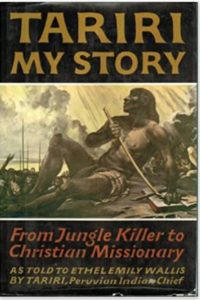What happens when a headhunter is introduced to God?

This was the subject of the book Tariri, My Story: From Jungle Killer to Christian Missionary, which Lynda and I read aloud a couple of months ago. The events of the book took place in the 1950s, when missionaries reached a section of the upper Amazon River at the border of Peru and Ecuador.
From the book’s dust jacket: The great chief Tariri was a legendary figure among the tribes along the eastern slopes of the Andes in southern Peru. The tales of his brutal killings were told with wonder even among his own people, the Shapras of the Candoshi group. A vital, colorful leader, he ruled his tribe through brute force and feared no one because of his fierce conviction that he was impregnable, inviolate.
Until two single women, workers with the Wycliffe Bible Translators group, arrived. Doris Cox and Lorrie Anderson, armed only with Bibles, pioneered the work among the Shapras and encountered the feared Tariri. He realized they were no threat to his rule, and so they were not accosted in any way, by him or others of his tribe. They went to work, joined by Rachel Saint at times. Slowly they helped Tariri understand that a way to live was possible without killing. That you could be at peace with rival tribes.
The Peruvian government had agents and officials within 50 miles of Tariri’s tribe, but had not had any influence on them. The killing continued. They—the Shapras—understood they should not harm the government men who lived and mostly remained at the edges of their territory, but beyond that Tariri was the law and the government in his territory.
Slowly, the two white women began to influence the jungle chief. Over time, he turned away from killing and embraced a life dedicated to Jesus Christ. The change wasn’t easy for him, but it happened. Killing as a way of life, a way of settling disputes, ended.
The book, published in 1965, was fascinating. It was a little hard to read because of all the names and terms in Tariri’s language. His words were recorded on tape, and translated to English. The book is mostly his words, his story, with a little context provided by the missionaries who worked in the area.
I have no idea where we got this book. It likely sat on our shelves for years, waiting for us to notice it. I’m glad Lynda finally did. My intention was to not keep this, mainly because we have so many other books we’d like to get through. But I think we will keep it. I’d love for the grandchildren to read it some day. It is definitely 5-stars. Still available at Amazon, perhaps other places.